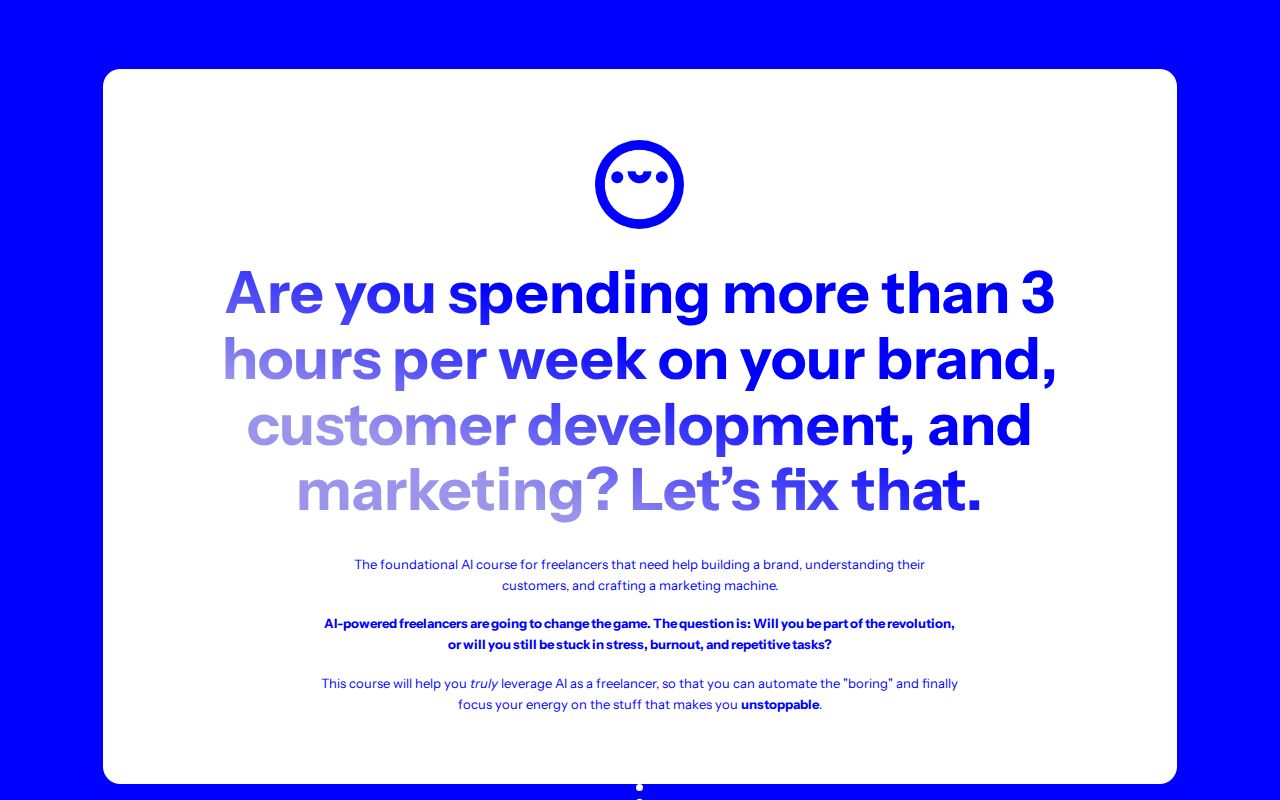I can clearly remember my first experience with commercially available AI. It was 2020, COVID lockdowns had become routine, and then came the app that quietly changed the course of my career:
OpenAI’s DALL·E.
The first image I ever generated was a risograph print of a cat. Nothing groundbreaking by today’s standards—but back then? I was speechless.

Looking at that image now, five years later, it’s wild to realise how far things have come. I went from low-res cat prints to coding websites with my voice.
That kind of leap doesn’t happen often. Usually, you need a world war or a new invention (like, light-bulb-level) to get this level of disruption.
But here we are. Five years. And it’s not slowing down.
The feeling between 2020 and today is comparable to finding a 1MB USB stick in a drawer, while holding a 256GB iPhone. Back then, we were mesmerised. Today, it’s laughable.
And that feeling? Yeah. It’s really time we get used to it.
SPOILER: There’s a future-planning worksheet at the end of this post!
The Age of AI: A million miles an hour2
Hardware moves slowly. There are physical constraints, like materials, manufacturing, and distribution. Every step requires physically moving materials around, and then there’s waste production, human power, and time.
Software, however… That’s pure logic. Ones and zeros, baby. Everything takes a click, a drag, or a key-press, and bam. New version. New update. New app.
And when we add AI to that mix? AI doesn’t just evolve fast; it accelerates its own evolution. Better AI helps you build better AI.
And suddenly, things don’t move fast. They move exponentially fast.
In short:
AI has evolved faster than anyone could have predicted — to the point where it is impossible for anyone to tell you – with certainty – what AI will be able to do next year… let alone next month, or even next week.
Fundamentally, this ^ is an exciting prospect. With so much shittery in the world right now? Yeah, I’m genuinely thrilled that there’ll be ever-more-advanced opportunities (maybe even daily) to solve the world’s problems. Win.
However, the pace at which AI / tech / the world is shifting means three things:
We don’t know when,
we don’t know how well, and
we don’t know how safely
…these “new shiny things that will change our lives forever” will proliferate.
And that introduces an “interesting” question for all of us Homo sapiens, namely:
How the f*** do I plan anything???!!??!?!?
Very. Fair. Question.
Here’s how I like think about this conundrum:
Imagine trying to cook dinner, except someone swaps-out one of the ingredients at random intervals, and someone else replaces one of your utensils at random intervals.
Starts getting difficult to make dinner, right?
Right.
And this is a daily experience for me at the moment:
Here I am, trying to think about how to develop my career and in which direction I should grow my business… but someone is constantly f***ing swapping out my “ingredients” and “utensil” all the time.
Me: “Maybe I’ll offer AI-assisted branding services.”
OpenAI: [launches Agents that can run entire client projects.]
Me: “OK, cool. I’ll focus on prompt engineering then.”
Google: [releases Gemini with voice + image context.]
Me: “Maybe I’ll niche into AI education for creatives?”
Microsoft: [announces Copilot is now embedded in everything from Word to your fridge.]
Me: “What if I build a Notion template to help freelancers adapt?”
Every startup ever: [releases 500 AI Notion templates by the time I finish breakfast.]

So… what do we do when our entire industry, our entire mode-of-working is a moving target? When strategy starts to feel like trying to staple jelly to a whiteboard?
Enter…
How to plan f***ing anything
Gone are the days of creating 1-year, 5-year, and 10-year goals.
Heck, gone are the days of creating roadmaps for the following month.
Inevitably, in this day-and-age, any plan based on actions and outcomes is going to fail. #ControversialOpinion
So, what now?
You stop trying to predict.
You start building systems that help you respond.
You stop relying on to-do lists.
You start relying on principles.
Not rigid plans. Not “2025 goals.” But filters, loosely held hypotheses you can update as the world updates itself.
Because here’s the thing: Freelancers are not corporations. We don’t need 5-year forecasts or 80-slide decks.
We need to make decisions this week about which offers to test, which tools to learn, and which client emails to ignore. And we need to do that without spiralling every time AI releases a new feature.
And this is when my mind exploded:
In freelancing, everything is always changing. So actually… nothing’s changed?
If, at the heart of freelancing – with or without AI – we’ve always had the same challenge: How do I make smart decisions with limited information, limited time, and zero guarantees?
Then, if anything’s true, we’ve always been prepared for exactly this kind of modus operandi. AI just made that dilemma louder. Faster. Loopier.
And in a weird way, that’s kind of comforting.
Because it means the answer hasn’t changed either:
We don’t need a plan. We just need a rhythm.
We need a system that lets us course-correct as the world course-corrects itself.
So, recently, I’ve stopped treating my business like a blueprint. Instead, I treat it like an operating system. A piece of software I can update as I go.
Here’s what that looks like for me:
I work in moments, not years: Every few days, I check in: What's working? What's dead weight? What’s killing my vibe?
I build modular offers, not fixed ones: Every service I offer is remittable. If one stops landing, I reshuffle the pieces.
I keep a principle list I check before I say yes to new things: Stuff like, “If I can’t explain it in 10 words, it’s not ready.” Or, “If it depends on one fragile platform, it needs a backup.”
I track energy and momentum, not just income: If something makes me want to throw my laptop out the window, it’s not worth the invoice. Out.
And, more practically, I’ve built my business on frameworks that stand the test of time.
I created a worksheet that you can use, save, print-out, stick on your wall… whatever helps! But it forces you to think in terms of principles rather than specific actions that will inevitably get thrown out when OpenAI releases ChatGPT+++++.
So yeah: Planning still matters. But adaptability matters more.
In this era, the freelancers who win won’t be the ones who predicted the next big thing. They’ll be the ones who built a system to adapt to it, without burning themselves out in the process.

